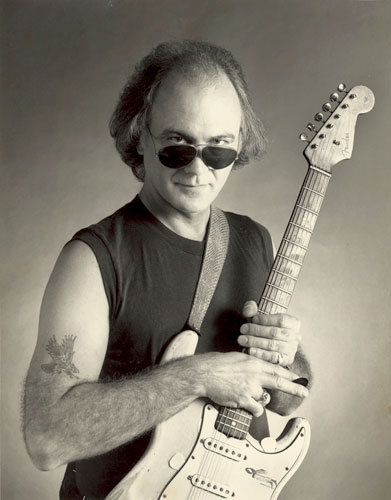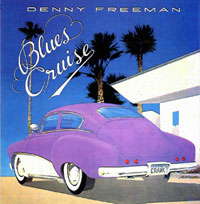To suggest that Denny Freeman was ‘in the right place at the right time’ belies the extreme effort, talent and devotion that must exist in order to sustain a 50+ year career as a full-time musician. Yet, as his resume, a laundry list of household names, and his place as one of the architects of the Austin, TX sound of the 1970s and 80s will confirm, Freeman was often in the right place at the right time to leave his mark on American music, even if it was rarely his name on the marquee outside.
Born in 1944 and raised in Dallas, Texas, Freeman was seized by music at the age of 11, as he was stopped dead in his tracks by a Ray Charles tune wafting through his house. Like countless kids his age, Freeman soon took to falling asleep to a transistor radio hidden under his pillow; Dallas’ geographical position meant that he was picking up – and absorbing – musical stylings from all over the country, and
those artists often played Dallas while on tour. (Freeman recalls catching Jimmy Reed, Bo Diddley, Ruth Brown, and The Clovers at the State Fairgrounds alone.) The music of Fats Domino, Little Richard, Chuck Berry, Muddy Waters, Howlin Wolf and many others became indelibly associated with friends, freedom, parties, dancing with and holding girls; a perfect soundtrack to the excitement of Freeman’s hormone charged teenage years, played out in America’s postwar prosperity.
But it wasn’t until a chance encounter with a local combo, whose non-singing guitar player exuded a coolness that rivaled Elvis’, that Freeman’s path was set. He often pinpointed the night as the moment his life was “ruined;” from that moment on, the guitar, and everything connected to it, was his top priority.
The Vietnam War, and Freeman’s desire not to kill or be killed for reasons that were nebulous at best, prevented him from pursuing a musician’s life straight out of high school, but by 1970, he found himself in Austin with several other young Dallas musicians: Jimmie Vaughan, Doyle Bramhall, Paul Ray, and soon after, Stevie Vaughan. Freeman explains, “we came to play blues. [We were all] unhappy with the direction rock was heading after the demise of Cream and Jimi Hendrix, [and] blues was the only thing that appealed to us.”
However, this was the height of the so-called ‘Cosmic Cowboy’ boom, and at least to Freeman, it seemed that audiences were not interested in hearing blues. Luckily, factors that made Austin hospitable to hippies (“cheap rent, a laid back atmosphere, lots of pretty girls,” Freeman remembers) were also appealing to struggling musicians, so Freeman and a handful of others were able to hang on, honing their craft for a meager turnout and even smaller payout.
In 1974, Freeman and Paul Ray started Paul Ray and the Cobras, a band whose R&B focused repertoire regularly required the group to learn new, complicated chords and progressions. Freeman, with his sensitive ear and burgeoning understanding of music theory, would often learn the new parts first and be tasked with teaching the rest, earning him the nickname, ‘Professor.’ Always one to encourage younger musicians, Freeman welcomed 2nd guitarist Stevie (not yet Ray) Vaughan into the band a year later. For songs requiring only one guitar, Freeman would switch to a Fender Rhodes electric piano, both enriching the band’s sound and expanding his own craft and abilities.
When Clifford Antone opened his namesake blues club in the summer of 1975, its effect was twofold. Not only did Antone’s provide Freeman and other local blues players a regular place to play, but the club also began booking the “real deal” blues and R&B artists like Jimmy Reed, John Lee Hooker, and Muddy Waters who had first captured a young Freeman’s attention through transistor speakers. These artists rarely maintained backing bands, so Freeman and others from Austin’s small blues pool backed Albert King, Walter Horton, Hubert Sumlin and so many others when they played the club.
The younger (mostly white) players like Freeman were honored and excited to play with their record collection heroes, and the older (mostly black) artists were astounded that these young players not only knew their material, but could play it correctly, with proper feeling. Soon the word was out that the Austin scene had incubated some world class talent. Among them, Denny Freeman.
By the 1980s, Freeman was a regular member of the Antone’s House Band, with guitar, piano and occasionally organ duties, backing Otis Rush, Jimmy Rogers, Hank Ballard and myriad other luminaries nightly. (Many of these performances were recorded, some were released.) He continued touring with The Cobras, and then as a member of the Angela Strehli Band. He hit the road with Lou Ann Barton in support of her major label debut. His ears perpetually open, Freeman fell in love with hard bop and, aided by the influx of more traditionally educated players from the Northeast, he began teaching himself standards. Shortly after, he successfully convinced Clifford Antone to let his jazz combo play the club in the afternoons; again, not a huge draw, but it provided invaluable experience playing out.
Freeman had long been wary of being pigeonholed as simply a “blues guitarist,” and his first two albums, released during this time, demonstrate the ever-widening ways in which he was willing to explore. The first, 1987’s Blues Cruise, contains the powerful rockers and blues numbers those familiar with his work would expect, complete with titular homages to early influences like Chuck Berry and BB King. However, the album also contains the only tunes to which Freeman also penned lyrics; while sung by Angela Strehli and Kim Wilson (of The Fabulous Thunderbirds,) this is a unique direction for someone who remained a non-singing musician his entire career. 1988’s followup, Out of the Blue, as the name suggests, furthered this musical exploration with tender ballads, Louisiana inspired fiddles, and external effects woven in as if another instrument, while also showcasing Freeman’s rollicking piano chops and every Texan’s near obligatory nod to ZZ Top. Out of context, the albums may come off as slightly directionless, but they do represent an accurate characterization of who Freeman was as a player and the direction he was to take his career, especially since they were crafted during an era when a record was a mark of a musician’s sincerity, professional intent and some level of success.
However, by the early 90s, Freeman was feeling limited by what Austin could offer. The blues landscape of the city was changing, and three major events – the death of Stevie Ray Vaughan, and the relocation of both Angela Strehli and Mel Brown – convinced Freeman that it was time for a change. He moved to Los Angeles in 1992, intending to focus, he recalled, “on writing songs… like everyone else out there.”
And while he did indeed write songs – for the Vaughan Brothers, for Percy Sledge, for Blondie – that is but one facet of his LA achievements. He was the guitar player Jimmie Vaughan selected for his first band as solo artist. He became a staple of LA’s local blues scene, finally fronting a band with his own name. He was called into countless studio sessions, recording on Nat King Cole’s piano for Jennifer Warnes’ The Well [Reprise] and with Percy Sledge on what would be the singer’s final studio album. He continued his forays into jazz, cutting several album’s worth of standards (demos only, he would humbly insist) with veteran sideman Mike Thompson. He wrote and released two more all-instrumental albums (1997’s A Tone For My Sins and Twang Bang in 2002) that documented his increasing comfort with and command of a diverse array of styles and genres, with far more cohesive designs and sounds than his earlier efforts. He joined the Phantom Blues Band, Taj Mahal’s backing group, and won a Grammy for his role on their live album, Shoutin’In Key.
In 2005, not long after returning to Dallas to care for his aging father, Freeman was invited to join Bob Dylan’s touring band, where he served for the next four and a half years, playing roughly 100 shows each year. During the first year of his tenure, Dylan took the band into the studio to record Modern Times, a critical and commercial success that gave Dylan his first number one album in 30 years. Freeman’s contributions are everywhere, his playing inextricably woven into the sound of the album.
Upon leaving Dylan’s band, Freeman recorded Diggin’ on Dylan, his own instrumental interpretations of sixteen Bob Dylan tunes, reinforcing just why he was in the band in the first place. It would prove to be his last release, and, uncharacteristically, was the only one in which he did not write all (or any) of the songs, suggesting the respect was mutual.
Freeman had been gigging in Austin during breaks in the Dylan tour schedule, and when he returned permanently in 2011, it was as a revered elder statesman, a proven veteran in a town and a scene only partially resembling what he left. While he continued to lend his talents to others in the studio, for the next decade, Freeman often played four (or more) shows a week, on par with, or exceeding, schedules of musicians half his age. His calendar encompassed all his musical loves: at the Continental Club Antone’s, he backed peers like LouAnn Barton and Bill Carter who also helped create the Austin sound of the 70s and 80s, and what few blues legends still remained. At the Saxon, he led one of the club’s most residencies, playing a setlist remarkably similar to that of his teenaged bands, with plenty of the early rock and roll, blues and R&B that first enthralled him. He played jazz every chance he got, routinely at the Continental Gallery with the Mike Flanigin B3 Trio (rounded out by Barry ‘Frosty’ Smith on drums) and the Elephant Room with Jon Blondell.
Sometime around 2016, Freeman began teaching himself non-pedal steel. He referred to it as his “new obsession,” and those who knew him came to see what an understatement that was. Learning to play the steel consumed him, and before long, he was confident enough to play out, leading his Saxon band into a separate, all pre-1970 country repertoire and additional residencies at other clubs. The steel is not an easy instrument, and Freeman was already over 70 when he first attempted it, but his devotion and eventual success were simply the latest example of a lifetime of perpetual musical exploration. (Indeed, his final gig was played on steel, hours before the world shut down in March of 2020.)
Denny Freeman passed away April 25, 2021, mere weeks after a cancer diagnosis. Death rarely reflects the life it ends, but that a man who quit his final ‘day job’ at the age of 25 to support himself by music alone should slip away during a time when live music ceased to exist is somewhat fitting.
Freeman did manage to leave instructions concerning his unfinished projects, a luxury those left behind in these situations are seldom afforded. — Stu Gilbert

Contact the Jungle
[email protected]
512-653-3785




